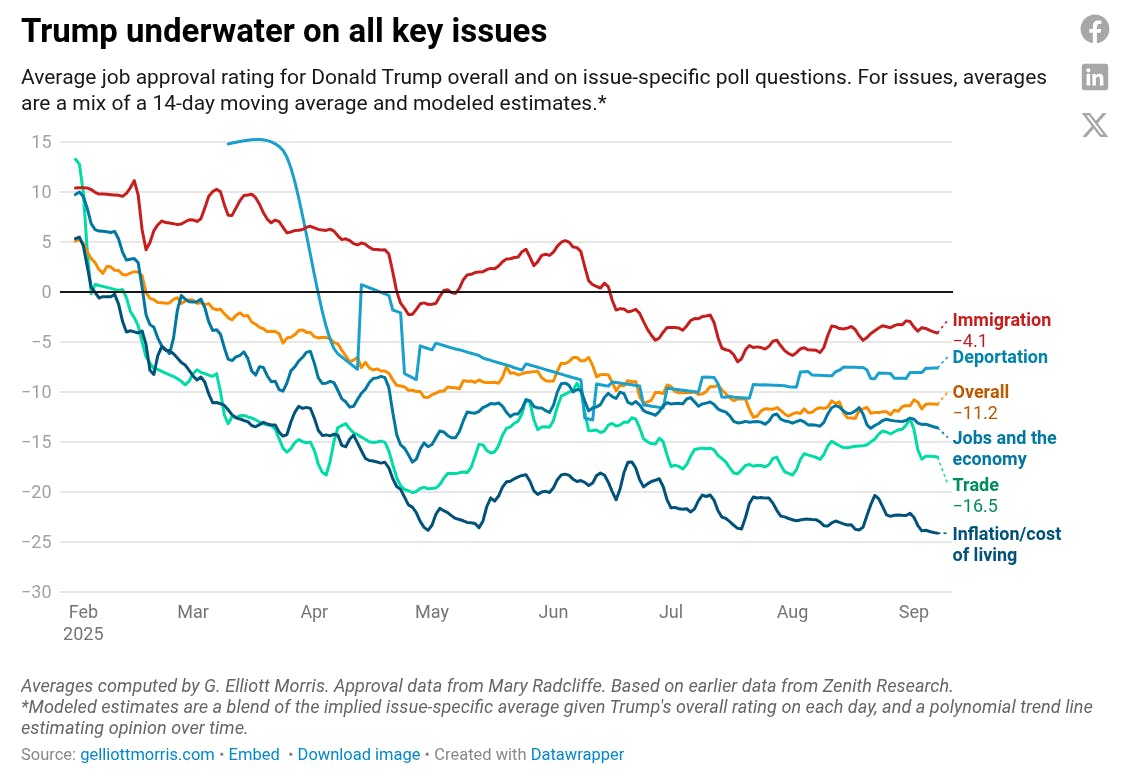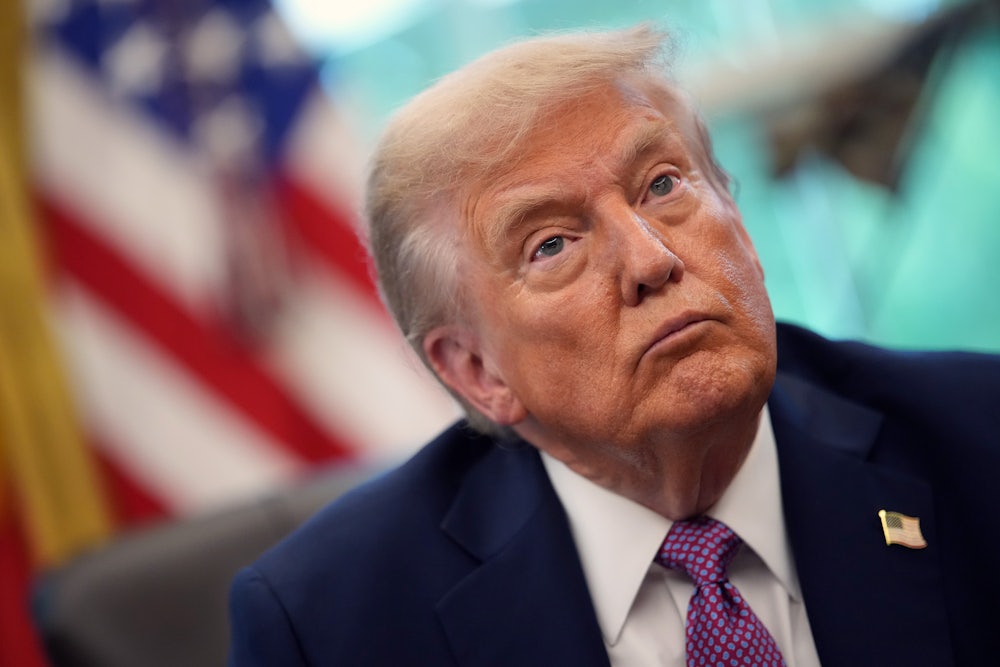President Donald Trump understands better than anyone else alive that his hold on his supporters—and on plenty of swing voters too—depends on the mere perception that he’s strong, wins everywhere, always acts boldly, and wields absolute mastery over his eternally feckless, disoriented enemies. Last month, after an anemic July jobs report, Trump fired the steward of jobs data, magically transforming the story from one about the Trump economy’s weakness into one about him decisively crushing a newly designated foe.
On Friday, however, the new jobs report found that only 22,000 jobs were created in August, far fewer than the 73,000 created in July. A downward revision of the previous month shows 13,000 jobs were lost in June. Shockingly, firing the commissioner of the Bureau of Labor Statistics could not disguise the impact of Trump’s own policies: As economists noted, most signs suggest his tariffs are an important reason for the slowdown.
All this suggests that Democrats have a fresh opening to undermine the foundation of Trump’s political strength by portraying him as a politically weak, failing, diminished, naked-emperor figure—and some new internal polling conducted by Senate Democrats hints at why.
The polling—conducted for the Senate Majority PAC and provided to The New Republic—probes voter attitudes toward Trump, his tariffs, and the economy. It finds that 56 percent of likely 2026 midterm voters nationally say Trump’s tariffs are hurting the economy overall, with 44 percent saying they’re hurting a lot. Only 32 percent say they’re helping. Among swing voters—defined as voters who switched in either direction from 2020 to 2024—57 percent say they’re hurting.
What’s more, the poll finds that 48 percent of overall likely 2026 voters say Trump’s tariffs are hurting their own economic situation, versus only 29 percent who say they’re not having any effect and an abysmal 8 percent who say the tariffs are helping their economic prospects.
Critically, the poll—undertaken by the Democratic firm Blue Rose Research, which surveyed over 10,000 people via web panel—also sought to gauge how all this is resonating with perceptions of Trump’s strength. It tested two messages, and found this:
Which of the following statements do you agree with more? President Trump’s tariffs make me think he is …
a strong leader taking on tough fights for America: 39 percent
a reckless leader making life more expensive for ordinary Americans: 51 percent
On tariffs, a majority of likely 2026 voters see Trump as a “reckless” leader and not a “strong” one. And among swing voters, that’s 50 to 32, reckless over strong.
This is striking, because it was initially reasonable to fear that his tariffs would code as an act of strength, an act of moving to protect, since they ostensibly involve using government power to shield American workers from foreign competition. Voters might have tuned out the details and merely seen Trump as acting decisively to defend Americans from global economic forces in a way his predecessors would not. This is likely why some Democrats have hesitated to take on the tariffs directly.
In reality, of course, tariffs are a tax on imports that gets heavily passed down to consumers who spend lots of income on imported goods impacted by those levies—the working and middle classes. They also threaten exporting industries (due to retaliation) and U.S. manufacturers who import secondary production goods, which also employ a whole lot of American workers.
Which is what we now see in the jobs data. As Mike Konczal of the Economic Security Project notes, the evidence in the jobs report is consistent with the notion that the tariffs are an economic drag. “The industries that are most affected by tariffs have dramatic slowdowns,” Konczal told me, citing various sectors in manufacturing and construction. “The tariffs are failing to increase jobs, and the uncertainty is almost certainly killing new ones.”
Between this new polling and the awful jobs numbers, Democrats no longer need to fear any Trump meta-advantage on the issue. An appeals court has found most of the tariffs to be illegal (though this will go to the Supreme Court), meaning they’re failing legally too.
By the way, many other polls support those findings. Pew, Fox, Gallup, and Quinnipiac have all found approval of Trump’s tariffs and/or handling of foreign trade mired in the 30s. A pollster aligned with Republicans recently warned that huge majorities believe tariffs are making inflation worse.
What’s notable about this Democratic polling, however, is that it suggests many voters expressly do not see the tariffs as an act of strength, as an act of protecting. Instead, they view him as being “reckless”—he’s floundering around wildly, aimlessly, and destructively.
This Democratic polling shows the party now sees Trump’s failing tariff regime as a big liability. “The polling does show that instead of creating strength or a sense of economic security, it is doing the opposite,” Lauren French, a spokesperson for Senate Majority PAC, told me. “When you are reckless on the economy, you don’t actually project strength.”
Trump relentlessly runs his messaging through a strong-versus-weak frame. He constantly uses the word strongly in descriptions of everything he does. For years he has attacked his foes as sickly and enfeebled. Trump’s most deranged displays—the silly claims about crowd sizes, the dumb imagery of his face attached to cartoonishly steroidal bodies, the vile agitprop about occupying U.S. cities—have an over-the-top quality that itself seems designed to convey an overbearing, resistance-is-futile aura.
Trump regularly runs his performance on issues through this frame too, but reality is shattering the illusion. Trump insists Russia wouldn’t have invaded Ukraine with him as president—and blusters that his feckless predecessors gave Ukraine away—but Vladimir Putin has humiliated Trump by keeping up the killing. Trump’s propagandists glorify his militarization of cities, but while it does constitute a massive abuse of power, Trump’s lawyers are unprecedentedly struggling to indict people swept up in his crackdown.
Meanwhile, Trump is fearsomely threatening to end mail-voting by fiat, and as Jamelle Bouie notes, Trump expressly wants such executive orders to be understood as monarchical edicts unbound by parliamentary limits. Yet Republicans quietly fear he’s undoing their own party’s struggle to reach vote-by-mail parity. Trump advisers have snookered reporters into writing that Democrats don’t dare criticize his mass deportations and military occupations of cities, but large majorities reject both, clearly not seeing either as “strength.”
Trump even runs his tariffs through this frame, insisting they’re necessary because previous weak and feckless leaders failed to stop other countries from ripping us off. But they’re badly debilitating us from within, and majorities see them not as strength but as blundering incompetence.
“Democrats need to attack this dimension of Trumpism—the essential story Trumpworld tells about him being ‘strong,’” says Democratic strategist Simon Rosenberg, who often argues for this. “The way they see politics is they operate in the strong/weak, winning/losing framework. We have to understand that and take it away from them.”
One reason Democrats hesitate to do this is that at first glance it might seem like there’s a paradox here. Trump is of course consolidating autocratic power in many unnerving ways. As law professor Kate Shaw put it to The Times, Trump is simply assuming for himself authorities that his predecessors never thought they possessed: militarizing cities via manufactured pretexts, firing statutorily protected agency heads, refusing to spend congressionally appropriated funds, shaking down media organizations and major cultural institutions, and much more. Calling Trump “failing” might seem to undercut warnings about the autocratic threat he poses.
But it doesn’t. Even as Trump’s illegal actions mount, in many instances he’s flailing and thrashing around with ludicrous ineptitude. Here is Trump ham-handedly boasting of sky-high approval ratings while his flunkies obsequiously flatter the two-bit tinpot’s mercurial megalomania:
TRUMP (lying): We just had the highest poll numbers I've ever had. Ever. And actually a record for a Republican.
— Aaron Rupar (@atrupar) February 21, 2025
REPUBLICAN GOVERNORS 👏👏👏👏 pic.twitter.com/FNzjsOMcGv
And here’s Trump getting brutally fact-checked after comically insisting his approval rating is 71 percent:
Trump: "I have the best poll numbers I've ever had."
— The Bulwark (@BulwarkOnline) August 5, 2025
Kernen: "You don't have the best you've ever had in overall polls...Your haters cite polls that have you down in the thirties."
Trump: "They're fake polls. pic.twitter.com/8TBXXqYYit
In reality, G. Elliott Morris’s polling averages have Trump’s overall approval at a new low of 42 to 54.
Morris’s calculations also show Trump deeply underwater on all key issues, underscoring his political weakness:

There is a way to reconcile this authoritarianism-versus-failure paradox. Democrats can denounce Trump’s abuses for the Rubicon-crossing threat they pose—while also asserting that his multiplying failures are exactly why those abuses are growing more menacing and unconstrained. In short, Trump is a floundering figure of buffoonish incompetence who is simultaneously consolidating authoritarian power, which is precisely what makes this situation so combustible and dangerous. And Democrats can say exactly that.






